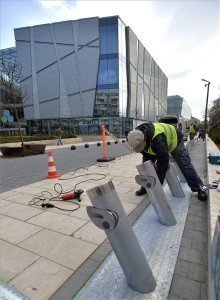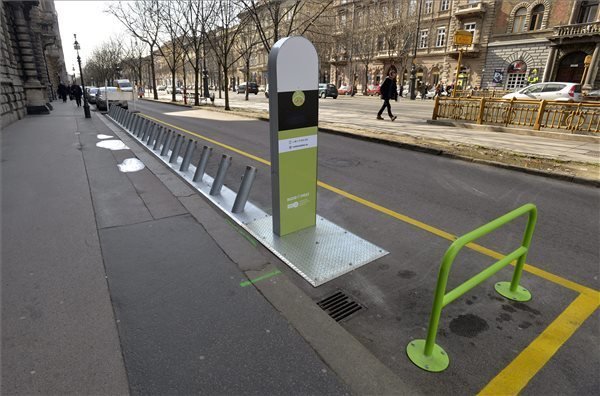Public bicycle system of Budapest – How much is it?

In knowledge of its prices, the press has already proclaimed “Bubi”, the forthcoming bicycle system of Budapest Europe’s most expensive one. In search of the truth, kerekagy.blog.hu contacted BKK (Budapest Transportation Center) and compared the tariff of many European system to find out how fair is this statement.
According to BKK, the prices of Budapesti Bérbringa (Bubi) are moderately high, more and less expensive systems also exist. The goal of BKK is to make people buy annual tickets and gain regular users.
The tariff system
Those who want to use public bicycles have to pay three different fees, the first one is access fee. The different access fees are 24 hours, 72 hours, 96 hours, weekly, half-year, and annual fees.
The second one is the 25 thousand Forints deposit, which the user gets back in the end of the rental period. Half-year and annual rental don’t require deposit, in these cases the user have to sign a contract with BKK. After paying access fee and deposit the users can ride their bicycle as many times as they want, but only for half an hour, because after 30 minutes surcharge have to be paid, which is officially called user fee.
The 500 Forints user fee takes effect from the 31th minute, and increases in every half hour. Until the 90th minute it is 1000 Forints, then it rises progressively. According to foreign countries’ experiences half an hour is just enough to reach the destination with public bicycle, generally no one uses them for more time. Probably it will be the same here, the furthest stations are 20-25 minutes away from each other.
There are two discounts: from the price of the half-year and the annual ticket, 5000 Forints can be used for cycling so it’s not a problem if the user runs out of the 30 minutes limit. Moreover, those who have annual BKV tickets can buy annual Bubi tickets at half price.
London is more expensive
Although the best known examples have already been described in several places, kerekagy.blog.hu investigated the topic in more detail. What obvious at first sight is that the 18,900 HUF annual ticket is considered too expensive in international relations even if 5000 Forints of it can be used for timeout (which anyway isn’t particularly necessary besides good network coverage and intended use). Furthermore, the 50 percent discount for those who have annual BKV ticket affects only 62 thousand people, and hopefully not only them will be involved in using the system.
The relatively high price of the annual ticket is also problematic from the standpoint of a former feasibility study which presumed that 75 percent of the users will have a season ticket. It’s a relatively ambitious, but not an unrealistic plan: according to the London system’s data of February 2013, 66.6 percent of the rented bikes were used by season ticket holders.
Kerekagy.blog.hu used six European systems besides Budapest to compare prices: those in Paris, London, Brussels, Dublin, Barcelona, and the Nextbike, which operates in several German cities. Aggregating the data it turns out that the annual ticket is more expensive only in London, but the occasional or periodic license fees are similar to Bubi’s, as well as the fees for timeout, whereas there are significant differences between different systems. (The prices are given in HUF, in 310.55 HUF-Euro and 371.08 HUF-Pound exchange rate.)
| City | Name | Annual ticket (HUF) | 1 week (HUF) | 3 days (HUF) | 24 hours (HUF) | Timeout (HUF/min) | Timeout 2 (HUF/min) |
| Budapest | Bubi | 18900 | 2000 | 1000 | 500 | 500/30 | Until one and a half hours, 500/30, then it increases progressively |
| Dublin | dublinbikes | 6211 | 1553 | 155/30 | Gradually increasing, 742/30 over 4 hours | ||
| London | Barclays | 33397 | 3711 | 742 | 371/30 | Gradually increasing, maximum 55,662 | |
| Brussels | Villo | 9938 | 2329 | 497 | 155/30 | Gradually increasing, 742/30 over 2 and a half hours | |
| Paris | Vélib | 9006/12111 (30/45 min) | 2174 | 528 | 311/30 | 621/30, over one and a half hour: 1242/30 | |
| Barcelona | Bicing | 14645 | 230/30 | 1394/60 over 2 hours | |||
| Germany | Nextbike | 11180 | 2795 | 311/30 (with season ticket: 155/30) | For season ticket holders 1553 for the whole day |
Just to be sure, kerekagy.blog.hu examined several areas which are considered extremely expensive even in European context. The fee of the Hungarian system is more expensive than that of Switzerland and Norway (Oslo), the annual ticket’s price in Oslo is only one quarter of the Hungarian (15 Euros). Thus only the London annual ticket is more expensive than Bubi, but that is much more expensive (76.7 percent more).
As it is seen from the comparison, the 500 Forints timeout fee is relatively expensive for the second half hour (in foreign countries half or one Euro is typical). The details of the progressive tariffs are not known yet, so it is difficult to compare it to international examples. For more than 24 hours use we would have to pay 150 Pounds in London, while it is only 2 Euros per hour in Germany; what’s more, those who have a season ticket there don’t have to pay more than 5 Euros in all.
30 minutes are more than enough
The timeout is normally avoidable, since the main purpose of a system like this is to not to expropriate a bicycle for a long time, but rather to go to work/shopping/partying with it, leave it by the closest bike shed, and take another one after finishing. According to statistics made between 2010 and 2013 this method works in London, where an average person uses the bike for 18, on weekends for 27 minutes, while it is even shorter in Barcelona: the average time is 12.5 minutes.
To make the system work this way, it requires many, well-positioned stations, and quick removal of bikes from full sheds (Bubi will apply a two seat emergency shed, the bikes will be electrically lockable there if the shed is full).
Everyone was surprised
“We do it and don’t do it, we want it and don’t want it” said László János, president of the Hungarian Cyclists’ Club at the beginning of the week in connection with the dilemmas of Bubi public bicycle system’s installation.
This civil society organization took part in creating the 2009-2010 feasibility study which paved the way for the implementation of the system. The price level was defined in this study, but it was much lower than the currently planned level: they expected the annual ticket to cost 5 or 6000 HUF. The new pricing surprised the Cyclists’ Club, they requested consultations from Vitézy Dávid, which took place on Friday.
The prices are not definitive
 The leader of the cycling organization announced after the appointment that the BKK and the Cyclists’ Club agreed that they are going to cooperate in the communication of Bubi, since “everyone is working on this system to be successful”. Moreover, an even more important information has been said on the discussion: it turned out that the prices published above (and in several other places) are not definitive, the registration fee might be reduced, and several discounts are being planned.
The leader of the cycling organization announced after the appointment that the BKK and the Cyclists’ Club agreed that they are going to cooperate in the communication of Bubi, since “everyone is working on this system to be successful”. Moreover, an even more important information has been said on the discussion: it turned out that the prices published above (and in several other places) are not definitive, the registration fee might be reduced, and several discounts are being planned.
Kerekagy.blog.hu was informed from BKK sources that the first 1000 users may get further reductions within the framework of an introductory action: they might get the annual ticket for 12,000 HUF instead of 18,900, the half-year ticket for 8000 HUF instead of 9450, 5000 HUF from the former and 3000 from the latter could also be used for timeout. The first round buyers will be the luckiest, they might get the annual Bubi ticket for 6000 HUF, from which 5000 also can be used for cycling more than 30 minutes.
Members of the civil society organization questioned not only the pricing but also some elements of the traffic engineering coordination plan, for instance they didn’t understand that contrary to earlier plans why have some stations been moved to less fortunate places. BKK said on the discussion on Friday that there were a lot of compromises about the placement of stations, part of them “almost unacceptable”, but they can be subsequently corrected. The stations are mobile, 6 or 8 screws fix them, so they can be replaced even in only an hour of work – said the president of the Hungarian Cyclists’ Club.
At the same time László János emphasised that the errors of the system are much less serious than the benefits it will provide. The first time that people in Budapest can use public bikes is promised to be the end of April.
based on article of kerekagy.blog.hu
Translated by Zsófia Luca Szemes
Photo: MTI
Source: https://darkgoldenrod-woodcock-377971.hostingersite.com/






